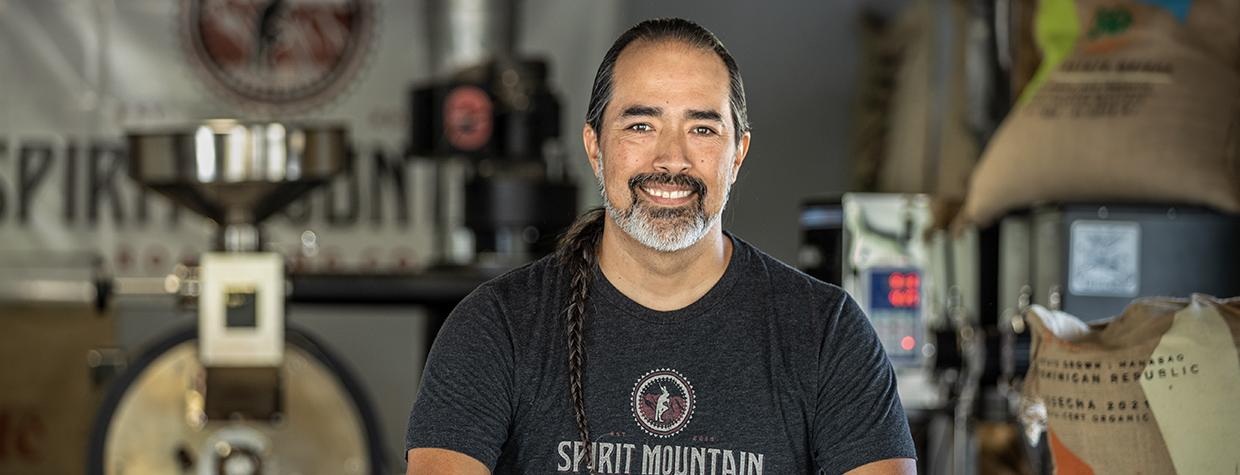Nothing against Yuma. But as a burr-grinding, pour-overing coffee snob who sometimes travels with his Chemex carafe and a stash of unbleached filters, I didn’t have especially high hopes for my morning Joe while in town a few years back. Yuman coffee, I feared, would be more Yuban than Yirgacheffe. The plastic canister of past-its-freshness-date Folgers in the Airbnb’s cupboard did little to assuage my concerns. Nor was I especially eager to spend money at the Yuma locations of a certain coffee colossus with roughly 42 zillion java joints scattered throughout the known universe.
Then, while wandering in downtown’s Brinley Avenue Historic District, I found Cafecito, a genuine indie coffeehouse operating out of an 1899 adobe. The coffee was outstanding, and the barista told me it was Oaxacan Mixteca Alta from Spirit Mountain Roasting Co., a local roaster.
Jump ahead to this past spring: Outside Cafecito, which is bidding adios to the adobe and moving into bigger downtown digs, I hop into the Toyota Tacoma of Arriquippa “Tudor” Montague (pictured), Spirit Mountain’s founder. He wears his hair pulled back into a long braid, and even with gray in his beard, the 47-year-old has a youthful quality, as well as a relaxed, if focused, manner.
Montague is an enrolled member of the Fort Yuma-Quechan Tribe, whose lands straddle the Colorado River at Yuma and extend into California, where Montague roasts his beans. We cross the river on the historic Ocean-to-Ocean Highway Bridge, then pass the whitewashed St. Thomas Yuma Indian Mission and a cluster of tribal government buildings before reaching miles of farmland, green with neat rows of melons and celery.
The Spirit Mountain facility is a simple structure, maybe
500 square feet, and it holds two roasters where Montague produces 150 to 200 pounds of beans weekly. “Something I take pride in is that I’m actually roasting the coffee on the reservation,” Montague says. “I can hire community members, and then they don’t have to travel into town to work. So, yeah, I’m proud that we can say ‘rez-roasted.’ It happens here, right in the community.”
On the walls, Montague displays an Edward Curtis photo of a woman from the Fort Mojave Indian Tribe, a Colorado River people closely related to the Quechans, as well as burlap coffee bags from Colombia and other countries. Stacked on the floor are sacks of green coffee beans, including Montague’s last stash of a crop harvested the previous season in Chiapas, Mexico.
Montague is a businessman, but he’s a businessman with a mission. Or several. He’s committed to creating economic opportunity and food sovereignty for the Quechans, and that’s reflected in Spirit Mountain’s motto: “Indigenous from seed to cup.”
“I look for Indigenous growers, especially woman-grown coffees,” he says. “I’ll purposely spend my money on those coffees, because I want to support them. I know I’m really small, I’m not a big company, but that’s part of our focus. Just being conscious of our footprint and directing our dollars to these kinds of groups.”
The James Beard Foundation selected Montague to serve as a mentor to people of color in the culinary industry as part of the organization’s Legacy Network program. And before launching Spirit Mountain in 2015, Montague worked as an environmental engineer focusing on regulatory implementation, wildlife management and habitat restoration projects with Western tribes and a tribal nonprofit organization.
He grew up in an agricultural region, but it wasn’t until he attended the University of Kansas that he discovered farm-to-table cuisine and craft beer. “That was my exposure to how much of a difference fresh can make,” he says. “I started home brewing, which involves taking raw ingredients — grains, hops, yeast — and putting them together to create something delicious and amazing. I really gravitated to it.”
Montague hoped to open a craft brewery and entered an intensive brewing science program. But he says the startup cost “was crazy. Hundreds of thousands of dollars to get the equipment and certification before you can even sell your first pint.”
Coffee roasting was similar to the roasting of barley for dark beers, and it had one important benefit: There was a much lower barrier to entry. So, Montague took his savings and bought a roaster that he still uses, then enrolled in a roasting school to deepen his understanding. “Coffee is kind of like wine,” he says. “You always hear winemakers talk about terroir, and it’s the same with coffee. You could grow the same plant varietal in Guatemala or Colombia, and they’re going to produce a different end product.”
We head back to Cafecito, where Montague lunches on an acai bowl and I have — what else? — a cup of black coffee. He describes his work as a board member with Native Seeds/SEARCH, the Tucson-based nonprofit dedicated to preserving a seed bank of heirloom crops adapted to growing in the Southwest. Growing, he says, is one of his passions, and he’s raised Yuma Yellow, a sweet corn historically cultivated along the Colorado, as well as white and brown tepary beans.
Even if the lower Colorado will never be known for its coffee crop, Montague sees a connection between Spirit Mountain and Quechan farming traditions. “I’m working with seeds every day — coffee is a seed that I roast,” he says. “It all goes back to what we can create from scratch.”
NEAR YUMA Spirit Mountain Roasting Co., 928-581-3765, spiritmountainroasting.com

